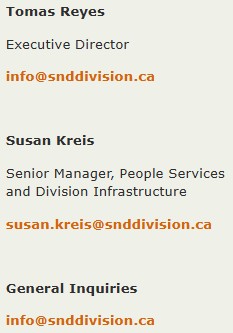
Dr. Anderson completed her residency at Surrey Memorial Hospital (UBC) and has been serving Surrey-North Delta since 2013. She provides longitudinal family practice care to patients from the newborn to the palliative stages of their lives. She has a special interest in women’s health and accepts referrals from community Family Physicians for contraceptive care, including IUD insertions.
It is a situation that every Family Physician has experienced: a patient comes in with a health issue, but it quickly becomes clear that there is an underlying problem that medical management won’t solve – housing insecurity, for example, or a stressful family situation.
When the Surrey-North Delta Division team, working groups and Fraser Health partners were designing our PCN services, this was a common difficulty that Family Physicians expressed. The PCN Social Work program was designed to address it. PCN social workers assist Family Physicians in supporting their patients’ social determinants of health through brief, solution-focused interventions.
We spoke with Dr. Maria Anderson about how she collaborates with the PCN Social Work program team to support her patients whose challenges go beyond their immediate health concerns.
“I began referring patients to the PCN social work program because I was dealing with many patients who were suffering from anxiety or depression due to social problems that I couldn’t fix,” she explains. “Anyone would feel anxious if they were facing eviction and homelessness.”
“I try to actively listen to the patient and determine if their issue stems from an actual illness or from a social or economic problem."
Dr. Anderson recalls feeling helpless when her patients would come to her with these kinds of challenges because she couldn’t solve them. “I didn’t know where to go for help,” she says.
So, when she heard about the PCN social work program, Dr. Anderson was eager to refer her patients. “I was grateful that I was able to request social work support for these patients, and they were grateful as well,” she explains. “PCN social workers were able to direct my patients to where they could find more housing options and other financial supports, including access to food and clothing. They also received support to complete the forms they needed to fill out to apply for BC housing and other resources that I didn’t know were available to them.”
Thanks to Dr. Anderson's close, long-term relationships with her patients, she is well-positioned to notice when a patient might need a PCN social work referral. “I try to actively listen to the patient and determine if their issue stems from an actual illness or from a social or economic problem,” she explains. “If social issues are a contributing factor, then I would consider a referral.”
These referrals have benefitted not only her patients, but Dr. Anderson as well. She explains, “PCN social workers have really helped in taking the cognitive load off my plate of trying to determine the social supports a patient can access and what forms the patient needs. One social worker even helped me fill out part of a Persons With Disabilities form.”
Dr. Anderson is happy with the support she and her patients have received from the PCN Social Work program. “I do recommend it to my colleagues,” she says. “The response time has been quick – within a week. They contact the patient, develop a good rapport with them and then send me a nice note with all of their interventions and recommendations. They’ve been really helpful.”
She also has a message for the PCN Social Work team: “I want to thank the social workers – hats off to them. They deal with the most difficult situations, and they do help. They make a difference.”
Learn More about the PCN Social Work Program



